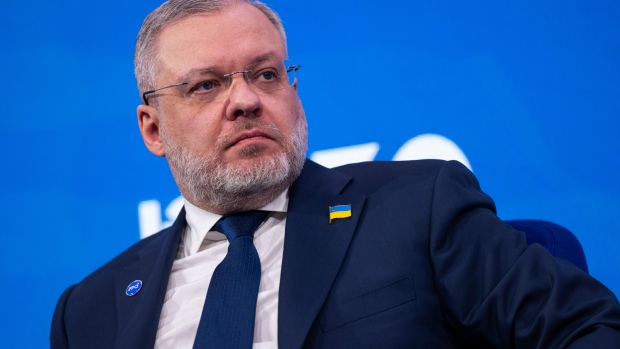Apr 6, 2024
Ukraine Hunts for Grid Equipment, Ammunition to Avoid Summer Blackouts
, Bloomberg News

(Bloomberg) -- Ukraine needs improved air defenses to protect its energy assets from Russia’s missile attacks and avoid blackouts this summer when electricity use approaches its winter peak, Energy Minister German Galushchenko said.
Energy facilities have become key targets for both Russia and Ukraine as the war drags into its third year. Moscow’s forces have struck at the Ukrainian energy grid to cripple its economy, while Kyiv has targeted Russia’s oil refineries to reduce fuel supplies to its military and the revenue it needs to finance the invasion.
Russia’s bombardments of Ukrainian energy targets in recent weeks were larger and better planned than the attacks in the previous two years, knocking out generating facilities and limiting power supplies. That has made restoring equipment and protecting the grid key priorities for the government even as it struggles to assess how much damage has been done.
“The destruction was significant — in power generation and in electricity transmission. The situation is difficult,” Galushchenko said in an interview in his office on Kyiv’s main street. “We still do not understand the scale of damage as many facilities are still in rubble and we can’t reach them.”
The total losses haven’t been officially estimated, though Galushchenko said they already measure in billions of hryvnia — 1 billion hryvnia is equivalent to about $26 million — and may continue to rise. The scale could eventually reach billions of dollars, he said.
Already, six gigawatts of power have been affected, officials have said, three times more than Ukraine planned to import from western allies this winter. DTEK, Ukraine’s largest private energy company, said 80% of its facilities have been severely damaged.
Galushchenko said Ukraine is searching for the energy equipment it needs all over the world — and in particular in neighboring countries — to replace its damaged machinery. But that hunt may be pointless unless the nation has sufficient air defenses, he said. A vital US aid package totaling more than $60 billion is locked in the House, and ammunition is running short.
Ecological Disasters
Thermal and hydropower stations have been the main focus of Russia’s strikes in the spring. Those attacks threaten not only electricity losses, but ecological disasters as well, Galushchenko said.
“Attacks on hydropower generation are acts of terrorism and war crimes, as they affect not only energy production, but the operation of dams across the rivers,” the minister said.
After Ukraine’s Dnister and Kaniv hydro facilities were hit in recent weeks, President Volodymyr Zelenskiy warned that Russia wanted to repeat the disaster that took place in the Kherson region last summer, when the destruction of the Kakhovka dam created massive flooding.
Russia’s goal is to ruin Ukraine’s economy, Galushchenko said, adding that more damage to the grid would make it difficult to meet this summer’s consumption peaks.
“We will definitely communicate with people,” he said. “Everyone wants to live comfortably, but we have to think about the fact there are limitations at this time.”
In the past two years, Kyiv used a successful campaign of “reasonable consumption,” implementing rolling blackouts, halting electric municipal transport and asking Ukrainians to use only those devices they really needed.
“Depending upon the situation in July and August, we will ask people to save as much as possible,” Galushchenko said. “The Russians can’t cause a repeat of the blackouts of 2022 and 2023. Even in the case of huge damage, we’ll have basic generation that covers 30% to 50% of our needs.”
Galushchenko didn’t rule out increasing the electricity tariff for households, and said the government is studying multiple ways of financing repairs for its energy assets. Kyiv almost doubled the price for electricity in June last year after winter attacks.
“Today the situation is even more complicated, compared with last year, as we have lost a lot of hydropower production and have to conduct planned repairs of nuclear units,” he said.
Ukraine plans to construct two more nuclear blocks on Khmelnytskyi nuclear power plant, using equipment available. One of the units is almost ready, according to officials. Last July, Bulgarian lawmakers approved a plan to abandon a decades-old project to build a nuclear plant in the Danube town of Belene and negotiate the sale of equipment to Ukraine. The plan included the sale of two reactors, steam generators and other equipment.
“Once we have a block body, it will take us two and a half years to start operating the unit, which can add one gigawatt to power supply volumes,” Galushchenko said. “It is very important as the Ukrainian economy will need more electricity.”
©2024 Bloomberg L.P.






